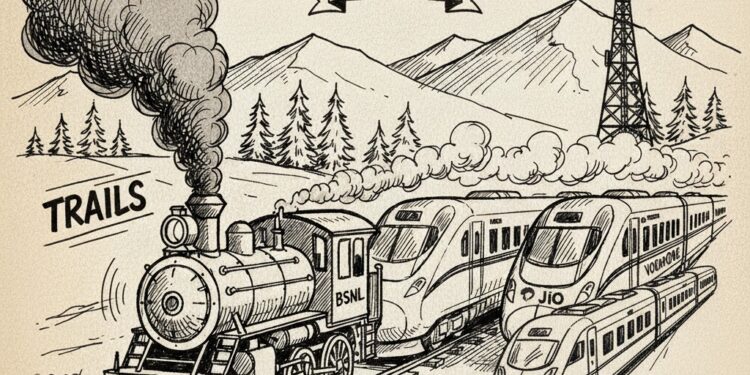Shillong: Bharat Sanchar Nigam Limited (BSNL) continues to struggle in key service benchmarks, falling well behind private telecom operators in the latest Independent Drive Test (IDT) conducted by the Telecom Regulatory Authority of India (TRAI) across Shillong city and East Khasi Hills district in September 2025.
The five-day test, covering 269.4 kilometers of drive routes, nine hotspot locations, and 1.6 kilometers of walk tests, assessed the real-world mobile network experience across 2G, 3G, 4G, and 5G technologies. The evaluation was conducted under the supervision of the TRAI Regional Office, Kolkata, utilizing standardized measurement tools and live environments.
Voice Services: BSNL’s Call Setup Rate Lags Significantly
BSNL recorded a Call Setup Success Rate (CSSR) of 73.63%, the lowest among all four major operators, compared with Airtel (96.34%), Reliance Jio (99.12%), and Vodafone Idea (80.20%).
The Drop Call Rate (DCR) for BSNL stood alarmingly high at 12.19%, more than 13 times Jio’s rate of 0.89% and five times Airtel’s 2.46%. This suggests severe reliability issues in BSNL’s voice network, particularly in hilly and rural terrain.
On Call Setup Time (CST), BSNL averaged 2.81 seconds, slower than Jio’s sub-second performance (0.97 seconds) and marginally behind Airtel (2.53 seconds) and Vi (2.08 seconds).
However, BSNL posted a relatively low Call Silence/Mute Rate of 1.30%, indicating fewer instances of audio gaps once the call connects — a small positive amid otherwise weak results.
Speech quality, measured by Mean Opinion Score (MOS), averaged 2.97 for BSNL, placing it in the “Fair” range, below Airtel (3.93), Jio (3.68), and Vi (4.51).
Data Services: BSNL Far Behind in Speed and Latency
BSNL’s data performance reflects the most pronounced gap.
The operator recorded an average download speed of just 0.98 Mbps across 4G/3G/2G networks — nearly 56 times slower than Jio’s 5G/4G average of 55.11 Mbps and far below Airtel’s (55.11 Mbps) and Vi’s (17.32 Mbps) averages.
BSNL’s upload speed averaged 2.39 Mbps, marginally better than its download rate but still trailing behind private peers (Jio: 10.89 Mbps, Airtel: 7.62 Mbps, Vi: 6.84 Mbps).
The latency of 82 milliseconds — the delay in data transfer — was the highest among all operators, suggesting lag-prone connections unsuitable for real-time applications such as video calls or online gaming. In contrast, Jio reported 20.85 ms, Airtel 28.80 ms, and Vi 46.35 ms.
Hotspot Tests Reinforce Performance Divide
In hotspot zones — which included key tourist and institutional areas like Police Bazaar, IIM Shillong, Elephant Falls, and Umiam Lake — BSNL’s 4G performance remained poor, with an average download speed of 0.86 Mbps and upload speed of 2.51 Mbps.
Jio’s 5G network led with a 204.70 Mbps download and 14.53 Mbps upload, followed by Airtel’s 5G at 136.70 Mbps download and 14.56 Mbps upload, underscoring the growing urban dominance of private 5G networks.
Comparative Summary (Auto-Selection Mode)
| Operator | CSSR (%) | DCR (%) | MOS | Avg Download (Mbps) | Latency (ms) |
|---|---|---|---|---|---|
| Reliance Jio | 99.12 | 0.89 | 3.68 | 157.15 | 20.85 |
| Airtel | 96.34 | 2.46 | 3.93 | 55.11 | 28.80 |
| Vi (Vodafone Idea) | 80.20 | 3.49 | 4.51 | 17.32 | 46.35 |
| BSNL | 73.63 | 12.19 | 2.97 | 0.98 | 82.00 |
Legacy Infrastructure and 4G Rollout Gaps Hurt BSNL
The findings highlight BSNL’s continued struggle to modernize its network, particularly in Northeast India, where terrain and infrastructure challenges exacerbate the operator’s nationwide performance gap. While the public-sector telco has initiated indigenous 4G rollout under the Atmanirbhar Bharat initiative, deployment delays and limited 5G presence have hindered its ability to compete with private players.
Analysts note that BSNL’s relatively stable speech clarity once calls connect may point to strong legacy switching systems but inadequate capacity and radio coverage. Unless BSNL accelerates its 4G expansion and transitions to 5G, its service quality may continue to lag behind private competitors who are aggressively investing in next-generation infrastructure.
TRAI’s Shillong IDT underscores a widening digital divide between public and private telecom operators. While Reliance Jio and Airtel dominate both voice and data metrics, BSNL’s performance remains below regulatory expectations across most parameters.
The report serves as both a benchmark and a warning — that without swift modernization, BSNL risks losing its competitive relevance in India’s fast-evolving telecom landscape.

















